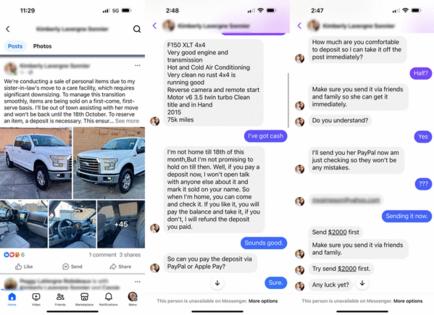Jim Rossman: Facebook scammer wants your quick deposit
Published in Science & Technology News
I see a certain kind of Facebook scam fairly often. It is easy to recognize.
They start out with a small sob story about someone who is moving to assisted living or downsizing, and they need help to sell a bunch of stuff cheap.
The posts usually have a few dozen pictures of the items for sale. The items usually include a fairly new pickup truck, a late model car like a Honda Accord, various four-wheelers or side-by-side ATVs, tractors, riding lawn mowers, TVs, furniture and lots of other very desirable stuff – and the prices are shockingly low.
Usually, these posts show up in various Facebook groups from people you’ve never heard of, but this week, I saw one in my feed from one of my wife’s cousins. This is someone I know personally and am good friends with. I was certain this was a scam and I was surprised they were posting from her account.
One of the telltale signs of a scam post is that the scammer will turn off comments under the post and ask that you contact them directly via Facebook Messenger.
I decided to answer, as the post had only been up a few minutes.
I asked if the truck was still available.
These scammers explain that they are out of town to see to the sick relative’s affairs. They’ll be able to complete the transaction when they return, but they need a deposit to hold the item for you.
They have a few ways you can pay them instantly, and once you do, that’s the last you’ll hear from them, as they’ll close the PayPal or Venmo account and disappear.
In my case, they wanted a $2,000 deposit to hold the truck. Not a bad return for 15 minutes work.
I had no intention of paying any deposit, but I was on my lunch break and not very busy, so I decided to keep them chatting for as long as I could. They were adamant that I tag the PayPal transaction as a “Friends and Family” payment.
According to PayPal’s terms, purchased made through the Friends and Family type will not be eligible for coverage through PayPal’s Purchase Protection program, so the money will be gone.
I’m sure our scammer had several fake PayPal accounts ready to give to anyone who responded to the post. Those accounts would be active for one transaction, then deleted once the money was moved.
I kept them chatting until they gave up the PayPal address, which I noted, but I finally told them I knew what they were up to and that I’d reported them to Facebook and the authorities and they quickly ended the chat.
I did reach out to my wife’s aunt, to tell her that her daughter had been hacked.
Bottom line is to always be cautious and if it’s too good to be true, just ignore it. Reporting the post to Facebook is also quick and easy.
©2024 Tribune Content Agency, LLC.







Comments